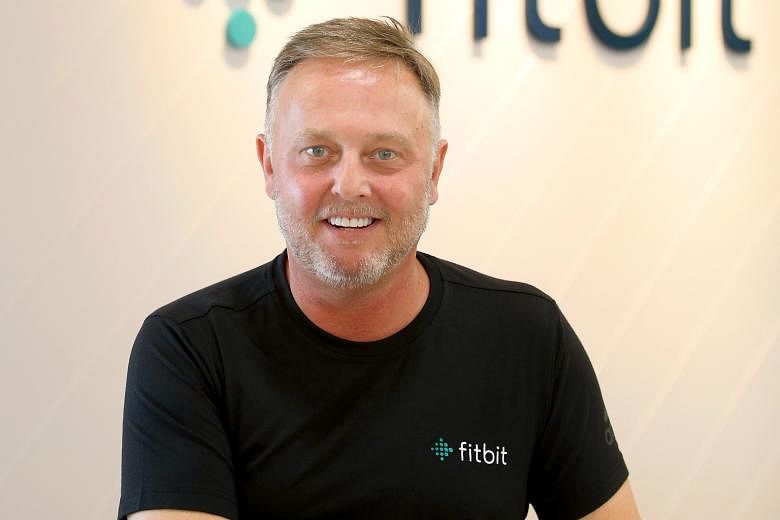Seventy-nine trillion: that is how many steps fitness wearables company Fitbit has recorded since it launched its first fitness tracker in 2009, enough for the average person to walk around the world more than a million times.
It is the mark of a company that has gone all-in on health and fitness, growing from a hopeful start-up in 2007 to a tech giant boasting US$2.17 billion (S$2.9 billion) in revenue last year.
But it could also be the sign of a tired consumer fad that has run its course if you listen to the naysayers, who point to the rise of smartwatches with integrated fitness functions like the Apple Watch and the corresponding decline in Fitbit's global shipments.
Overall sales for fitness trackers declined 0.9 per cent in Q2 2017, the first time a decline has been recorded, according to analyst firm International Data Corporation. Meanwhile, smartwatch sales grew 60.9 per cent in the same period.
The global wearables market is worth an estimated US$7 billion, with growth expected to be 35 per cent by 2019.
Fitbit's response has been to launch its own smartwatch, the Ionic, in August but it is not about to discard its focus on health and fitness that is at the core of the company's philosophy.
"Our vision is ultimately to help everyone in the world get healthier. I used to get asked all the time if fitness trackers are a fad but it's not. People passionately care about their health and fitness," said Fitbit vice president and Asia-Pacific general manager Steve Morley.
-
STEPS RECORDED BY FITBIT SINCE 2009 AND COUNTING
79,000,000,000,000
"The smartwatch category is growing, and people want a number of the other smart features that come with it, but at Fitbit, our focus is on health and fitness and we can do so much more with it.
"How we do that is by collecting the data, understanding the customer and providing with the right health insights."
For example, the Fitbit Ionic features new sensors for measuring heart rate and oxygen levels in the blood, which among other things could help with diagnosing sleep apnoea, said Morley.
Sleep apnoea is a disorder in which a person has one or more pauses in breathing while asleep, and affects about 5 per cent of the adult population. It often goes undiagnosed, and comes with an increased risk of high blood pressure, stroke and heart attacks.
The Ionic's other features should thus be understood as a means to an end to keep the device on users' wrists for as long as possible to record that health data.
Earlier this month, the company launched its own contactless payment option in Singapore, called Fitbit Pay, partnering United Overseas Bank and OCBC Bank.
Users can add their credit or debit cards to the Fitbit app and make payments through the Ionic.
"Payments are a perfect example of what we're trying to do and that's why we've made so much effort for a five-day battery life as well," said Morley.
"The intent is health and fitness but we can do that better by adding features that people really value the utility of so they keep (the device) on their wrists, we collect more data and we can help them more. It's a virtuous circle."
Still, basic fitness trackers are not likely to disappear completely, at least not in Singapore.
"They are likely here to stay. The Government's push to encourage Singaporeans to exercise more and eat healthily has motivated many to take better care of their health and well-being," said Regina Yeo, adjunct senior lecturer of marketing at the National University of Singapore (NUS) Business School.
"Health and fitness trackers may not necessarily be at risk of being rendered irrelevant by smartwatches as each appeals to different customer segments in the market.
"Some users may only want to wear a simple fitness tracker and do not need the bells and whistles that come with smartwatches."
Fitbit does not break down its user numbers in different markets, but the company currently holds more than 80 per cent market share of the health and fitness tracker category in Singapore.
With competition in the wearables market becoming increasingly intense, a potential new area of growth for Fitbit is to harness the data it collects in partnership with the healthcare sector.
Morley said the company is looking to tackle four health areas specifically: heart disease, chronic diseases like diabetes, stress and sleep apnoea.
In Singapore, one in nine people has diabetes, with this number rising to 3 in 10 for people over 60 years old.
"This goes beyond devices. We're sitting on five billion nights of sleep, for example, and we can really start to help by working with hospital programmes or government-sponsored initiatives," said Morley.
"Just imagine if you gave permission for your doctor to look at your Fitbit stats. Imagine how much better a picture of your overall well-being he could get.
"It could absolutely change the way healthcare is delivered. That's the opportunity, and that's a lot more useful than a watch."
•The Business of Sport is a monthly series that explores the current trends and talking points of the emerging sport industry.


